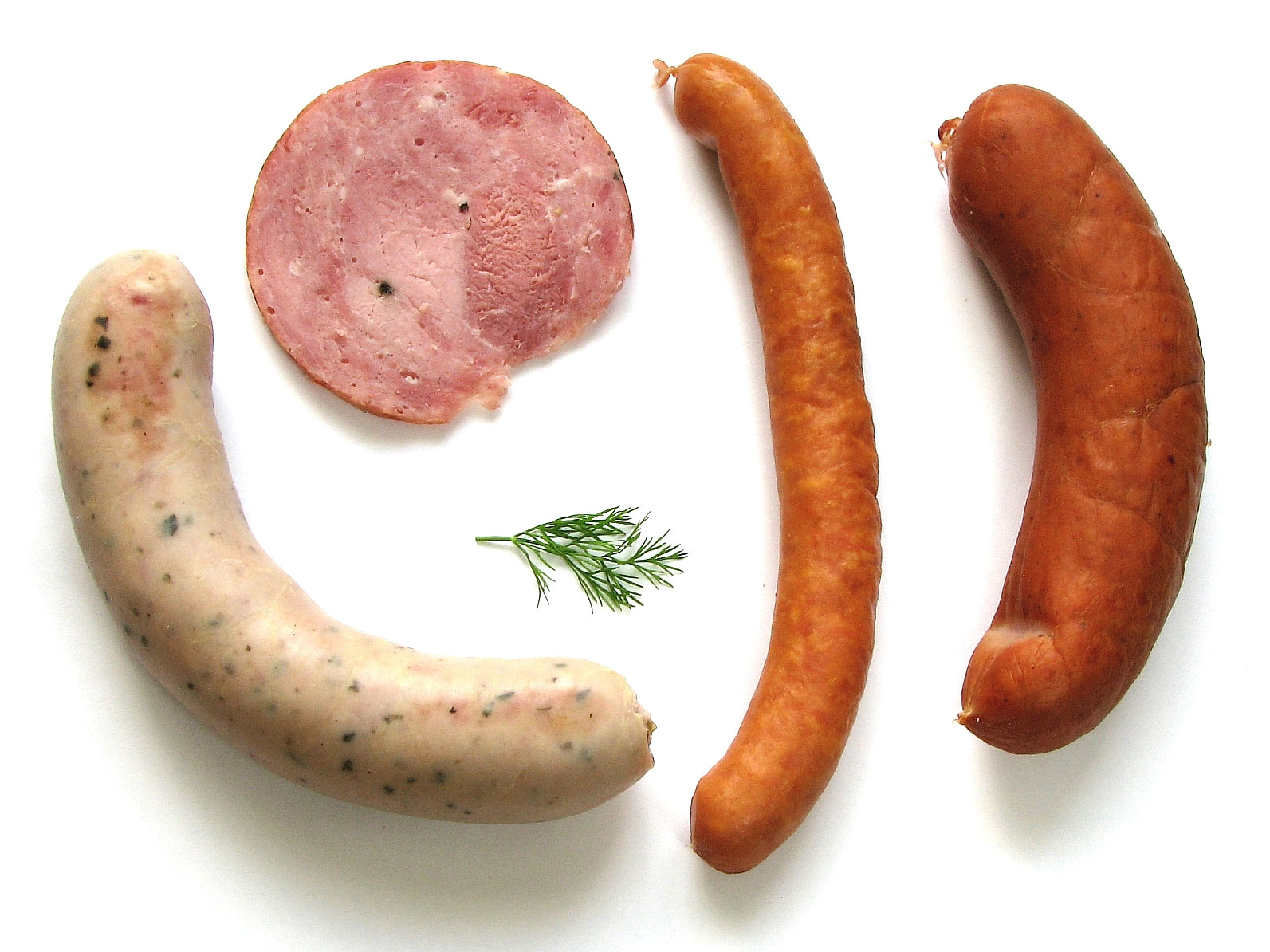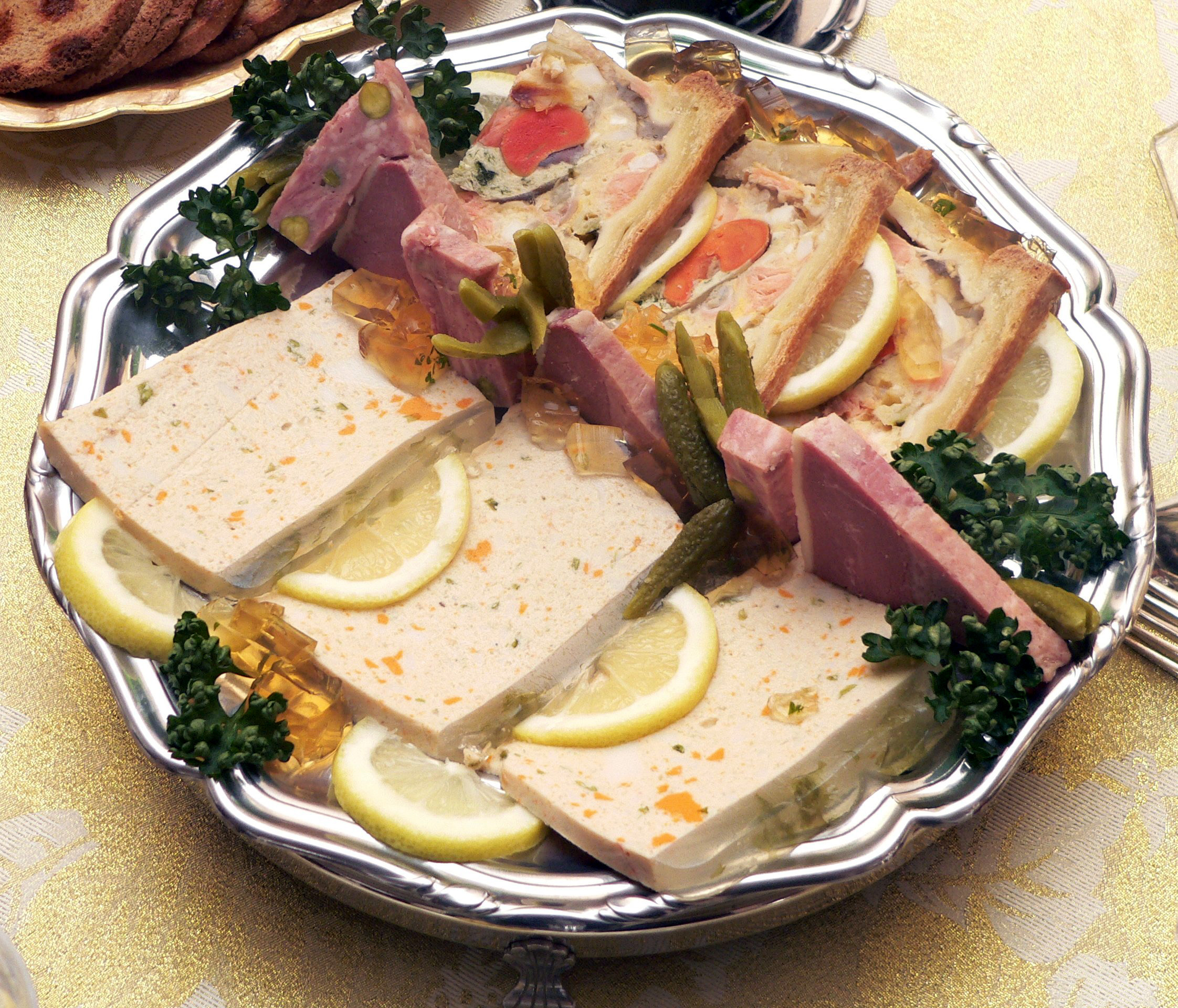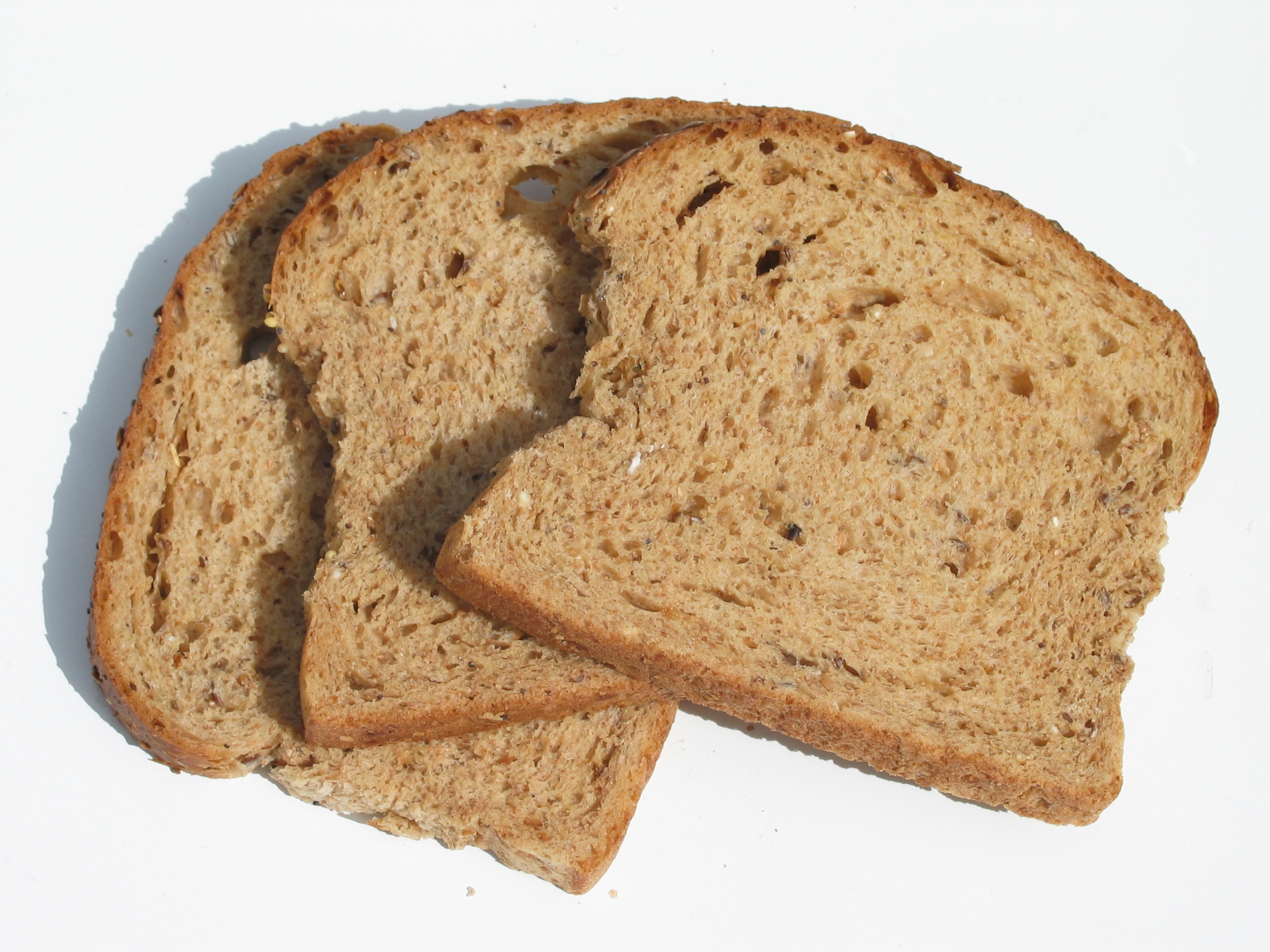|
Weckewerk
Weckewerk is a sausage, native to Northern Hesse, Germany. It is made from cooked brawn and minced meat, veal or sausage, and broth of pork, sometimes from cooked meat, blood and offal. The sausage is stretched with stale bread, explaining the name: "Weck" or "Wegge" is the traditional term for roll in Northern Hesse. It is seasoned with onions, salt, pepper, marjoram, regionally also with caraway, allspice and garlic. The ingredients are ground and mixed. To be consumed within a short time, the mixture is packaged in pig intestines. If longer storage is desired, it is preserved in jars or filled in artificial casings. Weckewerk, also called Weckewurst, can be eaten cold or fried in a pan. The former mayor of Kassel, Philipp Scheidemann Philipp Heinrich Scheidemann (26 July 1865 – 29 November 1939) was a German politician of the Social Democratic Party of Germany (SPD). In the first quarter of the 20th century he played a leading role in both his party and in the young Weima ... [...More Info...] [...Related Items...] OR: [Wikipedia] [Google] [Baidu] |
Weckewerk
Weckewerk is a sausage, native to Northern Hesse, Germany. It is made from cooked brawn and minced meat, veal or sausage, and broth of pork, sometimes from cooked meat, blood and offal. The sausage is stretched with stale bread, explaining the name: "Weck" or "Wegge" is the traditional term for roll in Northern Hesse. It is seasoned with onions, salt, pepper, marjoram, regionally also with caraway, allspice and garlic. The ingredients are ground and mixed. To be consumed within a short time, the mixture is packaged in pig intestines. If longer storage is desired, it is preserved in jars or filled in artificial casings. Weckewerk, also called Weckewurst, can be eaten cold or fried in a pan. The former mayor of Kassel, Philipp Scheidemann Philipp Heinrich Scheidemann (26 July 1865 – 29 November 1939) was a German politician of the Social Democratic Party of Germany (SPD). In the first quarter of the 20th century he played a leading role in both his party and in the young Weima ... [...More Info...] [...Related Items...] OR: [Wikipedia] [Google] [Baidu] |
Hessian Cuisine
Hessian cuisine is based on centuries-old recipes, and forms a major part of the Hesse identity. Reflecting Hesse's central location within Germany, Hessian cuisine fuses north German and south German cuisine, with heavy influence from Bavarian cuisine and Rhenish Hesse. Sour tastes dominate the cuisine, with wines and ciders, sauerkraut and handkäse with onions and vinegar popular. Drinks The Rheingau, which overlaps with western Hessen, is one of the main wine-growing regions in Germany, and the smaller Hessische Bergstraße region produces dry wines popular in South Hesse. Cider is also widely drunk, especially in the Frankfurt-am-Main area. The local Apfelwein ("apple wine", known as ''Ebbelwei'' or ''Ebbelwoi'' in the Hessian dialect) is traditionally served from a large clay jug called a ''Bembel'' and drunk from a glass with a diamond pattern called a ''Geripptes'' ("ribbed"). Other popular sour drinks include ''Speierling'' – Apfelwein with service tree berries added – ... [...More Info...] [...Related Items...] OR: [Wikipedia] [Google] [Baidu] |
Sausage
A sausage is a type of meat product usually made from ground meat—often pork, beef, or poultry—along with salt, spices and other flavourings. Other ingredients, such as grains or breadcrumbs may be included as fillers or extenders. When used as an adjective, the word ''sausage'' can refer to the loose sausage meat, which can be formed into patties or stuffed into a skin. When referred to as "a sausage", the product is usually cylindrical and encased in a skin. Typically, a sausage is formed in a casing traditionally made from intestine, but sometimes from synthetic materials. Sausages that are sold raw are cooked in many ways, including pan-frying, broiling and barbecuing. Some sausages are cooked during processing, and the casing may then be removed. Sausage-making is a traditional food preservation technique. Sausages may be preserved by curing, drying (often in association with fermentation or culturing, which can contribute to preservation), smoking, or ... [...More Info...] [...Related Items...] OR: [Wikipedia] [Google] [Baidu] |
Hesse
Hesse (, , ) or Hessia (, ; german: Hessen ), officially the State of Hessen (german: links=no, Land Hessen), is a States of Germany, state in Germany. Its capital city is Wiesbaden, and the largest urban area is Frankfurt. Two other major historic cities are Darmstadt and Kassel. With an area of 21,114.73 square kilometers and a population of just over six million, it ranks seventh and fifth, respectively, among the sixteen German states. Frankfurt Rhine-Main, Germany's second-largest metropolitan area (after Rhine-Ruhr), is mainly located in Hesse. As a cultural region, Hesse also includes the area known as Rhenish Hesse (Rheinhessen) in the neighbouring state of Rhineland-Palatinate. Name The German name '':wikt:Hessen#German, Hessen'', like the names of other German regions (''Schwaben'' "Swabia", ''Franken'' "Franconia", ''Bayern'' "Bavaria", ''Sachsen'' "Saxony"), derives from the dative plural form of the name of the inhabitants or German tribes, eponymous tribe, the Hes ... [...More Info...] [...Related Items...] OR: [Wikipedia] [Google] [Baidu] |
Germany
Germany,, officially the Federal Republic of Germany, is a country in Central Europe. It is the second most populous country in Europe after Russia, and the most populous member state of the European Union. Germany is situated between the Baltic and North seas to the north, and the Alps to the south; it covers an area of , with a population of almost 84 million within its 16 constituent states. Germany borders Denmark to the north, Poland and the Czech Republic to the east, Austria and Switzerland to the south, and France, Luxembourg, Belgium, and the Netherlands to the west. The nation's capital and most populous city is Berlin and its financial centre is Frankfurt; the largest urban area is the Ruhr. Various Germanic tribes have inhabited the northern parts of modern Germany since classical antiquity. A region named Germania was documented before AD 100. In 962, the Kingdom of Germany formed the bulk of the Holy Roman Empire. During the 16th ce ... [...More Info...] [...Related Items...] OR: [Wikipedia] [Google] [Baidu] |
Offal
Offal (), also called variety meats, pluck or organ meats, is the organs of a butchered animal. The word does not refer to a particular list of edible organs, which varies by culture and region, but usually excludes muscle. Offal may also refer to the by-products of milled grains, such as corn or wheat. Some cultures strongly consider offal as food to be taboo, while others use it as everyday food or even as delicacies. Certain offal dishes—including '' foie gras'', '' pâté'', and haggis —are internationally regarded as gourmet food in the culinary arts. Others remain part of traditional regional cuisine and may be consumed especially during holidays. This includes sweetbread, Jewish chopped liver, U.S. chitterlings, Mexican menudo, as well as many other dishes. On the other hand, intestines are traditionally used as casing for sausages. Depending on the context, ''offal'' may refer only to those parts of an animal carcass discarded after butchering or skinning ... [...More Info...] [...Related Items...] OR: [Wikipedia] [Google] [Baidu] |
Stale Bread
Staling, or "going stale", is a chemical and physical process in bread and similar foods that reduces their palatability - stale bread is dry and hard. Mechanism and effects Staling is not simply a drying-out process due to evaporation. One important mechanism is the migration of moisture from the starch granules into the interstitial spaces, degelatinizing the starch. The starch amylose and amylopectin molecules realign themselves causing recrystallisation. This results in stale bread's leathery, hard texture. Bread will stale even in a moist environment, and stales most rapidly at temperatures just above freezing. While bread that has been frozen when fresh may be thawed acceptably, bread stored in a refrigerator will have increased staling rates. Countermeasures Anti-staling agents used in modern bread include wheat gluten, enzymes, and glycerolipids, mainly monoglycerides and diglycerides. Culinary uses Many classic dishes rely upon otherwise unpalatable stale bread ... [...More Info...] [...Related Items...] OR: [Wikipedia] [Google] [Baidu] |
Kassel
Kassel (; in Germany, spelled Cassel until 1926) is a city on the Fulda River in northern Hesse, Germany. It is the administrative seat of the Regierungsbezirk Kassel and the district of the same name and had 201,048 inhabitants in December 2020. The former capital of the state of Hesse-Kassel has many palaces and parks, including the Bergpark Wilhelmshöhe, which is a UNESCO World Heritage Site. Kassel is also known for the '' documenta'' exhibitions of contemporary art. Kassel has a public university with 25,000 students (2018) and a multicultural population (39% of the citizens in 2017 had a migration background). History Kassel was first mentioned in 913 AD, as the place where two deeds were signed by King Conrad I. The place was called ''Chasella'' or ''Chassalla'' and was a fortification at a bridge crossing the Fulda river. There are several yet unproven assumptions of the name's origin. It could be derived from the ancient ''Castellum Cattorum'', a castle of the ... [...More Info...] [...Related Items...] OR: [Wikipedia] [Google] [Baidu] |
Philipp Scheidemann
Philipp Heinrich Scheidemann (26 July 1865 – 29 November 1939) was a German politician of the Social Democratic Party of Germany (SPD). In the first quarter of the 20th century he played a leading role in both his party and in the young Weimar Republic. During the German Revolution of 1918–1919 that broke out after Germany's defeat in World War I, Scheidemann proclaimed a German Republic from a balcony of the Reichstag building. In 1919 he was elected Reich Minister President by the National Assembly meeting in Weimar to write a constitution for the republic. He resigned the office the same year due to a lack of unanimity in the cabinet on whether or not to accept the terms of the Treaty of Versailles. He continued to be a member of the Reichstag until 1933 and served as mayor of his native city of Kassel from 1920 to 1925. After Adolf Hitler and the Nazi Party seized power in 1933, Scheidemann went into exile because he was considered one of the "November criminals" held ... [...More Info...] [...Related Items...] OR: [Wikipedia] [Google] [Baidu] |
German Sausages
German(s) may refer to: * Germany (of or related to) **Germania (historical use) * Germans, citizens of Germany, people of German ancestry, or native speakers of the German language ** For citizens of Germany, see also German nationality law **Germanic peoples (Roman times) * German language **any of the Germanic languages * German cuisine, traditional foods of Germany People * German (given name) * German (surname) * Germán, a Spanish name Places * German (parish), Isle of Man * German, Albania, or Gërmej * German, Bulgaria * German, Iran * German, North Macedonia * German, New York, U.S. * Agios Germanos, Greece Other uses * German (mythology), a South Slavic mythological being * Germans (band), a Canadian rock band * German (song), "German" (song), a 2019 song by No Money Enterprise * ''The German'', a 2008 short film * "The Germans", an episode of ''Fawlty Towers'' * ''The German'', a nickname for Congolese rebel André Kisase Ngandu See also * Germanic (disambi ... [...More Info...] [...Related Items...] OR: [Wikipedia] [Google] [Baidu] |




_1572.jpg)
.jpg)